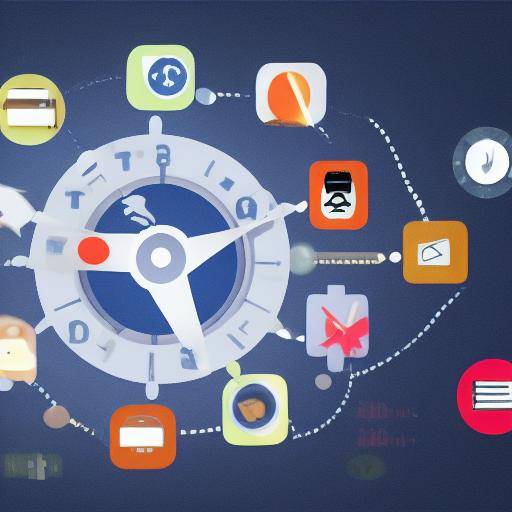
Time is an invaluable resource that, if used efficiently, can promote success both at the personal and professional level. Time management has become a crucial aspect in modern life, where labour, family and social demands compete for our attention. In this article, we will explore the best time management techniques, how to effectively manage time and strategies to increase productivity. From its historical origin to future trends, we will discover how to optimize the use of time to achieve goals and activities with focus and effectiveness.
Introduction
Time management refers to time planning and control dedicated to specific activities, with the objective of increasing efficiency and productivity. In the digital age, where distractions are constant, mastering this skill is fundamental to achieving the balance between work, leisure and family. In this article, you will learn proven techniques and strategies that will allow you to maximize your time and achieve your goals more effectively.
History and Background
Time management has been a constant concern throughout the history of humanity. From ancient lunar calendar systems to modern productivity devices, humans have always sought ways to organize their time efficiently.
Historical Origins
The first manifestations of time management can be traced to ancient civilizations, where the observation of natural cycles, such as lunar phases, allowed the development of the first calendar systems. These early advances laid the foundation for the organization of time in later cultures.
Evolution of Time Management
With the advancement of societies, time management became a more pressing concern. In the workplace, the Industrial Revolution marked a turning point in the way people organized their working day, with the advent of fixed timetables and the standardization of production.
Significant issues
The twentieth century brought technological innovations that revolutionized the way people managed their time. The emergence of electronic agendas, followed by the development of time management applications, allowed people to have greater control over their daily activities.
Analysis in Deep
Today, time management is a global concern, especially in a hyper-connected world where distractions are constant. The difficulty of focusing on a specific task has become one of the main challenges for personal and labour productivity.
Detailed Analysis
Benefits and Challenges
The correct management of time entails numerous benefits, both at the personal and professional level. It allows to avoid procrastination, optimize job performance and reduce stress. However, there are challenges, such as overwork and the difficulty in prioritizing activities, which can hinder efficient time management. It is essential to identify and overcome these obstacles to the optimal use of time.
Current trends
Time management is constantly evolving, especially in the context of the digital era. The emergence of productivity applications, mindfulness techniques and approaches based on personal effectiveness has redefined how people organize their time. These current trends offer new tools and perspectives to improve time management at all levels.
Comprehensive review
Time management is not only relevant at the individual level, but also plays a crucial role in the working and business environment. We will then explore best practices and success stories in implementing time management strategies in various contexts.
Applications and Best Practices
Various industries have implemented effective time management strategies to boost the productivity of their partners. From agile methods in software development to time management techniques in manufacturing, the practical applications of these strategies demonstrate their effectiveness in optimizing work performance.
Opinions of Experts and Future Implications
Time management and productivity experts offer new perspectives on how technological development and changing labour dynamics will influence time management in the future. Their views provide a clear view of emerging trends and implications for society at large.
Comparative analysis
Although the terms "time management", "time management" and "productivity techniques" can be considered synonymous in certain contexts, each addresses specific aspects of time optimization. Understanding the subtle differences between these concepts is essential to implement effective time management strategies.
Similarities and Differences between the Terms
While the terms can overlap in some respects, each highlights distinctive aspects of time optimization. Time management focuses on planning and organization of activities, while time management includes the effective control and implementation of these activities. On the other hand, productivity techniques focus on maximizing efficiency and performance in carrying out such activities.
Practical Tips and Accessible Tips
In implementing time management strategies, it is crucial to have practical advice and concrete actions that enable people to improve their use of time effectively.
- Prioritize important tasks: Identify the most relevant tasks and focus your energy on completing them before others.
- Sets temporary limits: Assist a specific time to each activity to avoid delay and increase your focus.
- Use time management tools: Apply productivity applications or planning techniques to optimize your daily organization.
Industry Perspectives and Expert Reviews
Interviews with industry leaders and time management experts offer a privileged view of current practices and challenges in time optimization. Their views and recommendations provide a clear picture of how time management influences job performance and quality of life.
Case Studies and Practical Applications
Case studies present real examples of successful implementation of time management strategies in work and personal environments. These practical applications provide a detailed overview of how time management techniques can be realized in tangible results and significant benefits.
Future Trends and Predictions
Finally, we will explore emerging trends in the field of time management and predictions about their future evolution. Identifying how technological development, changes in labour paradigms and new methodologies will impact time management is essential to proactively prepare.
Conclusion
Time management is a crucial factor in modern life, and its dominance can make the difference between success and failure in multiple aspects. Through the implementation of effective techniques, it is possible to maximize productivity and achieve a satisfactory balance between labour and personal demands.
Frequently asked questions
1. What are the best techniques to prioritize tasks in time management?
In time management, it is essential to identify the most relevant and urgent tasks. Use techniques such as the Eisenhower matrix or the 80/20 rule to effectively prioritize your daily activities.
2. How can I avoid procrastination by managing my time?
Procrastination is a common challenge in time management. Establish realistic time frames, remove distractions and divide tasks into smaller parts to avoid postponement.
3. Is it advisable to use digital tools for time management?
The tools digitize the time of the day to attend to the most demanding and complex tasks.
4. What impact does time management have on reducing labor stress?
Effective time management can significantly reduce labor stress by allowing early planning, equitable distribution of tasks and the possibility of scheduled breaks to rest and recharge energies.
5. What is the role of time management in the reconciliation between working and personal life?
Effective time management is critical to achieving a balance between labour and personal responsibilities. By prioritizing tasks, setting time limits and optimizing productivity, it is possible to devote quality time to personal life without neglecting work performance.
6. Are there risks associated with poor weather management?
Bad time management can result in chronic stress, reduced labor performance, exhaustion and lack of balance between personal and professional life. Therefore, it is crucial to acquire effective time management skills to avoid these risks.
Conclusion
In short, time management is essential for personal and professional success. By mastering effective time management techniques, it is possible to optimize productivity, reduce stress and achieve a balance between job and personal demands. Being aware of current trends and strategies applied in different contexts provides an opportunity to continually improve time management. Integrating these practices into the daily routine can provide lasting benefits and contribute to a more satisfying and productive life.
Throughout this article, we have explored the historical roots, current trends, effective strategies and future impacts of time management. By implementing these knowledge and advice, readers are equipped to expand their time management capabilities, enhance their productivity and live a more balanced and successful life.






















































